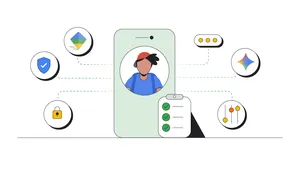Nowcasting on Search is bringing AI-powered weather forecasts to people across Africa

So much depends on the weather — from the small decisions like whether you’ll need an umbrella for your commute, to the critical ones like whether a farmer should lay down fertilizer or if there’s a risk of heavy rains washing it away. Coastal communities depend on fishing for sustenance and income, but sudden storms can endanger those at sea and their fishing boats. Seeking to help people answer these questions, teams at Google have been working on AI powered nowcasting for years, helping our users to understand exactly when and where they should expect precipitation over the next few hours.
Now, these short-term precipitation forecasts are being made available across Africa, for the first time. The forecasts are made possible through advancements in Google Research's AI-powered nowcasting model MetNet, which uses satellite data and ground observations to produce state-of-the-art precipitation forecasts in data-sparse regions of the world. Google’s technology can predict global precipitation with high accuracy within a 5km radius every 15 minutes for the next 12 hours — all under one minute.
Solving the problem of sparse ground observations
One critical component for weather forecasts is dense ground radar, which is not available for the majority of the world where billions of people live. The need for new approaches and better weather forecasts is especially pronounced in Africa, where ground observations are limited and global weather models tend to exhibit low skill. For example, North America has 291 radar facilities to track weather, while Africa has 37.
To scale nowcasting globally, our Research teams came up with an innovative new approach using globally available satellite observations in our nowcasting models.
Using AI and satellite observations, the model was able to fill in the gaps, even in areas where radar was unavailable, overcoming previous limitations in data sparse regions. It is also our first model to directly incorporate observations from a multitude of satellites.
Radar coverage globally. Source: An Overview of Using Weather Radar for Climatological Studies: Successes, Challenges, and Potential, Figure 1, Saltikoff, et al. 01 Sep 2019.

Instant, accurate weather: a better search experience for Africa
Nowcasting on Search is now live for users in Africa. The feature will display for weather searches across the continent with more precision than ever before.
The nowcasting experience in Search, shown in Kenya

What’s next?
We are excited to see this work leave our offices in Accra and Nairobi and make its way to users all across Africa. We are engaging with local scientific communities to further evaluate and improve forecast accuracy globally. We’re also looking to launch the technology in additional regions with limited radar.
Accurate weather forecasts are one example of how AI is helping to solve real-world challenges. At Google Research Africa, scientists and engineers in Accra and Nairobi are working with local experts to develop solutions that address societal needs. From improving weather predictions to projects like Open Buildings — which maps structures to support disaster response and urban planning — these efforts reflect a commitment to applying AI in ways that make a meaningful difference.
We're grateful to collaborate with researchers, organizations, and communities across Africa, whose insights are shaping technology that improves lives and builds resilience on the continent.





